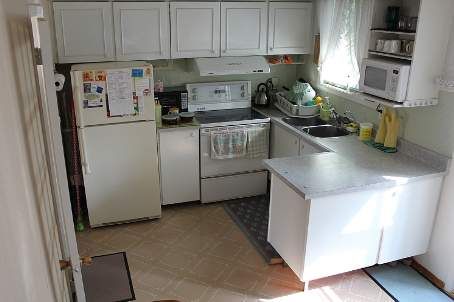“He’s been predicting that for years and it hasn’t happened yet.” It’s a common refrain heard as a housing bear, or indeed, a brush-off argument used against someone making predictions in a wide variety of other areas (e.g.: global warming). There’s a certain comforting logic to “it hasn’t happened yet.” After all, at some point you have to consider the possibility that your prediction was wrong and isn’t going to happen.
But the thing is, “it hasn’t happened yet” was true at the time the prediction was made, too. So one needs to try to estimate how much time is needed before you need to start worrying about events not unfolding as planned. It’s not a stand-alone argument.
When I first started getting bearish on real estate around 2007, I told Wayfare the time to buy wouldn’t come until 2010-2012. Here we are in 2011 and it’s still going to be years yet. The recent market troubles leading to a prolonged ZIRP in the states is not going to help matters on that front. While rising rates are not a necessary condition for the market to start to correct, they sure would help.
While I sometimes make some (small) speculative investment moves when going long, the extra risk factors of shorting have kept me away, even when I had some good reasons to be short. But if I could, I would be short Toronto RE now — no matter how I try and look at it, it looks over-valued unless I assume crazy things like ZIRP forever (a few more years, sure — but 25 more?). One issue with that though is timing: RE cycles are long, and can take years to play out. It’s very tough to have any manner of certainty when it comes to crowd psychology. I do have to stop every now and then and look back at the data and my analysis to wonder if I’m wrong, since it does keep defying gravity, and I keep coming back to the same conclusions. Assuming people do any math at all before making their purchase decision (and everything I’ve seen suggests they don’t), the current prices are factoring in continued price growth of at least 3-4%/year, with rates at basically nothing going out forever. Yet even many of the bull-inclined analysts and real estate associations are calling for a plateau as a kind of best-case scenario.
I went and re-read the story of Mike Burry, one of the few genius hedge fund managers that caught on to the brewing US real estate bubble in the early years. The problem was that by being early by several years, he strained the relationship with his investors as they constantly doubted him and his unpopular bets; he ended up closing his hedge fund as soon as he could (though not before making hundreds of millions of dollars by betting against subprime loans). It looks like being right but early seems to be every bit as bad as being wrong, at least as far as interpersonal relationships are concerned.
It’s tough because my cohort is of the home buying age. I feel like I have a responsibility to warn them of the dangers, that the “pride of ownership” is currently a several hundred dollar per month expense. I worry not only for my friends’ sake that they might in the not-too-distant future find themselves trapped and house poor, but also for my own guilty conscience over my inability to prevent a predictable loss. I’m haunted by visions of when the dinner party conversations inevitably switch from “we could add forty thou in value by putting in a second washroom” to “can you believe interest rates these days? We had to cancel our vacation this year to keep the house. I don’t know what we’ll do next year if they keep going up.”
But, what’s a socially acceptable warning? I’ve blogged about the matter enough that if they follow my writings, they probably already know my arguments and don’t care: I sometimes worry that maybe they don’t read my blog (though everyone, of course, should). Even if they’re not BbtP readers, surely they’ve at some point heard about the crash in the US (and around the world), which should have delivered the message that real estate doesn’t always go up. It is their money to lose; maybe they do have a few thousand a year to spend and value pride-of-ownership that highly — just because my pride is cheap doesn’t mean everyone’s is. Maybe the other assumptions don’t apply (like that they would actually save and invest the difference). Plus that timing issue keeps rearing its head: not many people think on 5 or 10 year timescales, so it’s hard to counsel patience on that level when people are making decisions for next month.
Plus, if I’m wrong (though this is one of my “highest conviction” long-term predictions), they’ll fucking hate my guts because real estate is so very emotional.
David Fleming at Toronto Realty Blog recently tried to get that across with a little anecdote, but got the moral of the story backwards. He describes, in a very round-about post designed to stir the pot (I know I shouldn’t give in), a place he liked to visit called Park City, Utah. This place like many others got caught up in the buying frenzy in the states, despite the fact that it was this little artificial town surrounded by empty land. There was no land scarcity, and no one should have bid up the prices of existing RE since you could just go a half mile down the road and build a new place on an empty lot. Yet they did anyway. It wasn’t a logical investment based on the fundamentals, it was emotion-driven. A frenzy. David then tries to spin that as being evidence that Toronto doesn’t have a bubble brewing: Park City had no land scarcity and prices crashed; Toronto does have land scarcity, so prices won’t crash.
But the true take-home message is that land scarcity has very little to do with short-term valuations. Was land any more or less scarce in 1989 in Toronto than it was in 1992? Yet prices dropped 30% in those 3 years. Is it any more scarce today than it was in 2001? Yet prices have roughly doubled. And of course in the US, the cities with equal land scarcity to Toronto also experienced run-ups in price and subsequent crashes.
Even in places like Park City, Utah — with abundant land for development all around — prices got over-heated and later corrected, even though it should have been obvious that a bubble was brewing and those rapid price increases didn’t make sense. How much easier then is it to then inflate prices beyond fundamentals in a place like Toronto, where the fundamentals aren’t quite staring you in the face so dramatically as the cornfield next-door?
Yet we come full circle: it hasn’t happened yet. Prices may be too high, having leap-frogged ahead of the fundamentals. Indeed, I’ve been arguing that it is highly likely that that’s the case. I figured that the most likely way such a large imbalance could be corrected was through a decline in prices, i.e.: a crash. It’s a very unstable position to be in for the speculators at the margin: losing money or at best breaking even on rental properties purchased recently with maximum leverage. It was always possible that the corrective action could instead be a long period of stagnation while inflation helps the fundamentals catch up to the price. The banks and the housing pundits pushed that theory, but I always thought that was very unlikely: we’re dealing with the madness of crowds, so exact timing is difficult, and long periods of stability are rare. But without the pressure of rising rates, that unlikely solution to the problem is looking well, a fair bit less unlikely.
Oh, and just before I hit publish I saw the news that the TREB stats for the first two weeks of August were released, and detached homes in the 416 were down something like 15% in price. While I would love to call that as the beginning of the end, I don’t think it means much at all. Prices were down about 15% last summer too, only to rebound in the fall. Plus there are very few transactions in the detached home segment, particularly in the summer doldrums, so it’s possible that the price decline is just a shift in the sales mix and not a legitimate decrease in prices. I wouldn’t get too excited just yet: see what the Teranet numbers have to say, or better yet, see if October brings a rebound. If it’s still weak by October I’ll start letting my hopes get high, and hold my breath through the spring that ZIRP be damned, buyer exhaustion has finally hit. But for now, I’m still a patient, sad bear.






 Questrade: use QPass 356624159378948
Questrade: use QPass 356624159378948 Passiv is a tool that can connect to your Questrade account and make it easier to track and rebalance your portfolio, including the ability to make one-click trades.
Passiv is a tool that can connect to your Questrade account and make it easier to track and rebalance your portfolio, including the ability to make one-click trades.